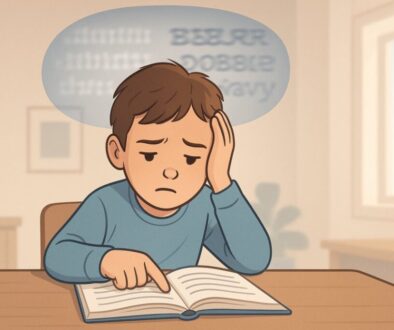
Do Concussions Cause Blurry Vision? Understanding Vision Problems After a Concussion
When a head injury leads to a concussion, the effects are often more than just physical pain. One of the most common, yet less understood, consequences of a concussion is blurred vision. For many, the impact on their visual system can be long-lasting, affecting daily life in ways they never expected. At Cook Vision Therapy Center, we specialize in helping people recover from concussion-related vision issues. If you’re wondering how concussions and blurred vision are connected, this article will break it down.
How Concussions Affect Vision
Concussions are a form of traumatic brain injury. They occur when the head is struck or jolted violently, disrupting brain function. The brain plays a critical role in processing vision, which means even a mild concussion can lead to visual disturbances.
The visual system is complex, with many parts of the brain responsible for everything from peripheral vision to eye movement and focus. When a concussion occurs, these areas can become damaged or disrupted, causing blurry vision and other issues.
Why Does Blurred Vision Happen After a Concussion?
A concussion can affect how the brain processes visual information. This can result in a variety of vision problems, including blurry or double vision. The connection between concussions and blurred vision often stems from damage to the brain’s visual processing centers. This part of the brain controls eye movements, eye focusing, and how we interpret what we see.
Blurry vision after a concussion is not unusual. It’s part of a larger group of symptoms known as post-trauma vision syndrome. This condition can also include eye strain, headaches, and difficulty focusing on objects or reading.
Common Vision Problems After a Concussion
Blurred vision isn’t the only visual issue that can occur after a concussion. Many people experience a wide range of visual problems following head injuries, including:
- Double vision: Seeing two images instead of one.
- Eye strain: Eyes feel tired, especially when reading or focusing on something close.
- Difficulty tracking objects: Problems following moving objects with the eyes.
- Visual field loss: Loss of peripheral vision or blind spots in the field of vision.
- Light sensitivity: Extreme discomfort in bright environments.
These types of vision problems typically persist for weeks or even months after a concussion if left untreated.
How Long Do Vision Problems Last After a Concussion?
The duration of vision problems after a concussion varies from person to person. For some, symptoms resolve within a few days or weeks. For others, they last much longer. If vision problems last after a concussion for more than a few weeks, it’s a sign that additional treatment is needed.
Vision issues can sometimes linger for months, especially if the concussion caused significant disruption to the visual system. In some cases, the problems from a concussion can last even longer, requiring specialized care, such as vision therapy, to resolve the symptoms.
Diagnosing Vision Problems After a Concussion
If you’ve experienced a head injury and notice blurred vision or other visual symptoms, it’s important to see an eye doctor. An eye exam can help diagnose any concussion-related vision problems you might be experiencing.
At Cook Vision Therapy Center, we perform thorough assessments of visual skills, eye movements, and focusing abilities. This helps us determine the extent of your vision problems and create a personalized treatment plan.
Vision Therapy for Post-Concussion Vision Problems
Vision therapy can be an effective treatment for post-concussion vision problems. Through a series of exercises, vision therapy helps retrain the brain and eyes to work together again. This therapy focuses on improving eye movement, coordination, and visual processing skills, which are often disrupted after a concussion.
The goal of vision therapy is to reduce or eliminate the symptoms of blurred or double vision, eye strain, and other issues. Vision therapy can help patients regain normal vision and improve their quality of life.
Treatment Options for Blurry Vision After a Concussion
If you’re dealing with blurred vision from a concussion, several treatment options are available. These include:
- Rest and recovery: In the early stages of concussion recovery, rest is often the best treatment. It allows the brain to heal and reduces the likelihood of worsening symptoms.
- Prescription eyeglasses: Some people may benefit from glasses designed to correct blurry or double vision. Prism lenses can also be helpful for those with eye alignment issues.
- Vision therapy: As mentioned earlier, vision therapy can help retrain the visual system to reduce symptoms of blurred vision and other visual disturbances.
- Gradual return to activities: As your symptoms improve, a slow, controlled return to normal activities can help your brain adjust without causing additional strain on your vision.
How Cook Vision Therapy Can Help
At Cook Vision Therapy Center, we understand how frustrating post-concussion vision problems can be. Blurred vision, eye strain, and difficulty focusing don’t have to be permanent. Our specialized vision therapy programs are designed to address the unique challenges caused by concussions.
With our treatment plan, we help patients regain their visual skills and improve their overall eye health. If you’re experiencing blurry vision after a concussion, we’re here to help you recover.
Conclusion: Blurred Vision After a Concussion Doesn’t Have to Last
Blurry vision is a common consequence of concussions, but it doesn’t have to be a long-term issue. With the right diagnosis and treatment, including vision therapy, many patients see significant improvement in their symptoms. If you’re dealing with post-concussion vision problems, don’t wait. Reach out to Cook Vision Therapy Center today to learn more about how we can help.



